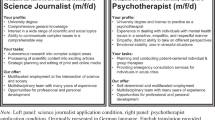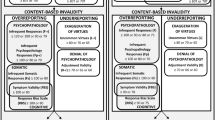Abstract
Based on a repeated measure of 164 Chinese university seniors on an established biodata instrument, it was found that subjects would fake in order to increase their chances of getting a job offer in addition to simply giving a socially desirable impression. It was also found that those who scored low on the biodata scale had a much higher magnitude of faking behaviors as compared with those who scored high on the scale. Scores on an integrity scale were found to be predictive of the magnitude of faking. The paper concludes with a discussion of the relationship between faking and social desirability and their effects on criterion validities of biodata instruments.
Similar content being viewed by others
References
Baer, R.A., M.W. Wetter, and D.T. Berry. (1992). "Detection of Underreporting of Psychopathology on the MMPI: A Meta-Analysis." Clinical Psychology Review 12, 509-525.
Barrick, M.R. and M.K. Mount. (1993). "Autonomy as a Moderator of the Relationships Between the Big Five Personality Dimensions and Job Performance." Journal of Applied Psychology 78, 111-118.
Barrick, M.R., M.K. Mount, and J.P. Strauss. (1993). "Conscientiousness and Performance of Sales Representatives: Test of the Mediating Effects of Goal Setting." Journal of Applied Psychology 78, 715-722.
Becker, T.E. and A.L. Colquitt. (1992). "Potential Versus Actual Faking of a Biodata Form: An Analysis Along Several Dimensions of Item Type." Personnel Psychology 45, 389-406.
Brislin, R.W. (1980). "Translation and Content Analysis of Oral and Written Material." In H.C. Triandis and J.W. Berry (eds.), Handbook of Cross-Cultural Psychology: Methodology, vol. 2, pp. 389-444. London: Allyn and Bacon.
Christiansen, N.D., R.D. Goffin, N.G. Johnston, and M.G. Rothstein. (1994). "Correcting the 16PF for faking: Effects on Criterion-Related Validity and Individual Hiring Decisions." Personnel Psychology 47, 847-860.
Doll, R.E. (1971). "Item Susceptibility to Attempted Faking as Related to Item Characteristics and Adopted Fake Set." Journal of Psychology 77, 9-16.
Douglas, E.F., M.A. McDaniel, and A.F. Snell. (1996). "The Validity of Non-Cognitive Measures Decays When Applicants Fake." Academy of Management Proceedings 127-131.
Gilmore, D.D. and G.R. Ferris. (1989). "The Effects of Applicant Impression Management Tactics on Interviewer Judgments." Journal of Management 15, 557-564.
Hinrichs, J.R., S. Haanpera, and L. Sonkin. (1976). "Validity of a Biographical Information Blank Across National Boundaries." Personnel Psychology 29, 417-421.
Hough, L.M., N.K. Eaton, M.D. Dunnette, J.D. Kamp, and R.A. McCloy. (1990). "Criterion Related Validities of Personality Constructs and the Effect of Response Distortion on TheseValidities." Journal of Applied Psychology 75, 581-595.
Hunter, J.E. and R.F. Hunter</del>. (1984). "Validity and Utility of Alternative Predictors of Job Performance." Psychological Bulletin 96, 72-98.
Kacmar, K.M., J.E. Delery, and G.R. Ferris. (1992). "Differential Effectiveness of Applicant IM Tactics on Employment Interview Decisions." Journal of Applied Social Psychology 22, 1250-1272.
Klein, S.P. andW.A. Owens. (1965). "Faking a Scored Life History Blank as a Function of Criterion Objectivity." Journal of Applied Psychology 49, 452-454.
Kluger, A.N., R.R. Reilly, and C.J. Russell. (1991). "Faking Biodata Tests: Are Option-Keyed Instruments More Resistant?" Journal of Applied Psychology 76, 889-896.
Lautenschlager, G.J. (1994). "Accuracy and Faking of Background Data." In G.S. Stokes, M.D. Mumford, and W.A. Owens (eds.), Biodata handbook, pp. 391-419. Palo Alto, CA: CPP Books.
Lin, B.C. (1984). "The Relationship Between Need for Praise, Personality, and Delinquency." Journal of Research on Education and Psychology 7, 1-17.
Markus, H.R. and S. Kitayama. (1991). "Culture and the Self: Implications for Cognition, Emotion and Motivation." Psychological Review 98, 224-253.
Muchinsky, P.M. (1994). "The Influence of Life History Experiences on Vocational Interests and Choices." In G.S. Stokes, M.D. Mumford, and W.A. Owens (eds.), Biodata Handbook, pp. 535-554. Palo Alto, CA: CPP Books.
Ones, D.S., C. Viswesvaran, and W. Korbin. (1995). "Meta Analyses of Fakability Estimates: Between-Subjects VersusWithin-Subjects Designs." Paper presented at the Tenth Annual Meeting of the Society of Industrial and Organizational Psychology, Orlando, FL.
Ones, D.S., C. Viswesvaran, and A.D. Reiss. (1996). "Role of Social Desirability in Personality Testing for Selection: The Red Herring." Journal of Applied Psychology 81, 660-679.
Rothstein, H.R., F.L. Schmidt, F.W. Erwin, W.A. Owens, and C.P. Sparks. (1990). "Biographical Data in Employment Selection: Can Validities be Generalizable." Journal of Applied Psychology 75, 175-184.
Schlenker, B.R. and M.F. Weigold. (1992). "Interpersonal Processes Involving Impression Regulation and Management." Annual Review of Psychology 43, 133-168.
Schmit, M.J., A.M. Ryan, S.L. Stierwalt, and A.B. Powell. (1995). "Frame-of-Reference Effects on Personality Scale Scores and Criterion-Related Validity." Journal of Applied Psychology 607-620.
Stevens, C.K. and A. Kristof. (1995). "Making the Right Impression: A Field Study of Applicant Impression Management During Job Interviews." Journal of Applied Psychology 80, 587-606.
Stokes, G.S., M.D. Mumford, and W.A. Owens. (eds.), (1994). Biodata Handbook. Palo Alto, CA: CPP Books.
Takata, T. (1987). "Self-Deprecative Tendencies in Self-Evaluation Through Social Comparison." Japanese Journal of Experimental Social Psychology 27, 27-36.
Thornton, G.C. and P.F. Gierasch. (1980). "Fakability of an Empirically Derived Selection Instrument." Journal of Personality Assessment 44, 48-51.
Yang, C.F. and C.Y. Chiu. (1987). "The Paradox Faced by Chinese Subjects: A Review of the Effects of Western Scales." Journal of Chinese Psychology 29, 113-132.
Zerbe, W.J. and D.L. Paulhus. (1987). "Socially Desirable Responding in Organizational Behavior: A Re-Conception." Academy of Management Review 12, 250-264.
Zickar, M., J. Rosse, and R. Levin. (1996). "Modeling the Effects of Faking on Personality Scales." Paper presented at the Eleventh Annual conference of the Society for Industrial and Organizational Psychology, San Diego, CA.
Author information
Authors and Affiliations
Rights and permissions
About this article
Cite this article
Law, K.S., Mobley, W.H. & Wong, CS. Impression Management and Faking in Biodata Scores Among Chinese Job-Seekers. Asia Pacific Journal of Management 19, 541–556 (2002). https://doi.org/10.1023/A:1020521726390
Issue Date:
DOI: https://doi.org/10.1023/A:1020521726390




